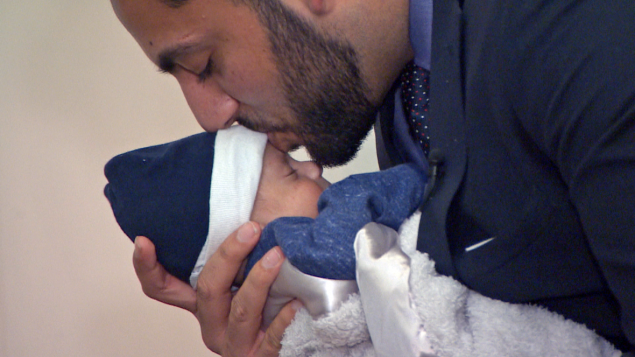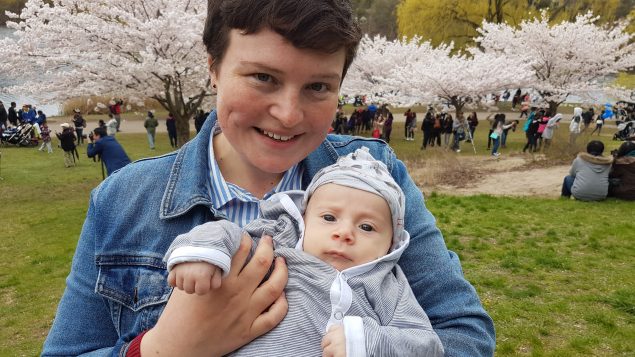The Reproductive Justice Story Project was started by Kate Macdonald following a rough experience giving birth in Toronto’s St. Joseph’s Health Centre.
“I had full-blown post-partum PTSD, I felt totally violated, and it really, really took a toll on me in the first year with my baby when I was supposed to be focusing on other things.” Kate recalls.
ListenDelivering a baby can be a terrifying experience even with the best of care and support. But for a first time mother who is not being well-cared for, or doesn’t feel well -cared for, it’s all the more difficult.
“So I know there are lots of us out there, dealing with similar feelings and not really having an outlet for them,” Macdonald said.
“No one is taking me seriously”
Her web site is currently collecting stories in an effort to document the problems, and what Macdonald describes as “obstetric violence”.
Kate Macdonald says for those women who are not having very positive experiences, there are a lot of common themes:
“So consent is a big one”, she says. “During birth, doctors and nurses not feeling like they need to ask, or they need to listen when a birthing person is telling them to stop, or slow down or saying no.”
And filing complaints is afterwards is not easy.
“It’s really, really hard to get it together to provide feedback and be advocating for yourself, especially if you’re home with a little one.”
Kate Macdonald says that for those who have registered their feedback or complaints, “almost all of it is kind of dismissed or ignored or it doesn’t really go anywhere.”
That’s why she is “asking people who have a story to share about disrespectful, or disempowering, abusive care that they’ve received during pregnancy, or during child birth, or even afterwards,” to share their story; document the experience.
“We want to get as much proof of the kind of issue as possible,” Macdonald says.
“I think it’s all about patient-centred care”
When asked how she would respond to a healthcare worker who might defend some actions on the grounds of a sudden emergency that leaves just moments for decisions to be made altering how a baby’s delivery might take place.
Macdonald doesn’t buy it
“I think that’s a great excuse that gets tossed around often, but emergencies like that don’t happen with every birth and, you know, taking the time to make the birthing person feel like they are safe and respected and part of whatever steps need to happen, is a way to make, even a really scary emergency situation feel less awful.”
“I think it’s all about patient-centred care” she says, adding that “if hospital staff don’t want to hear it, then we’ll just have to speak up louder”.
Sadly there was a tragic case last month near Toronto when doing just that might have saved a young mother’s life.
Ayesha Riaz, 24, had just delivered a healthy baby boy, so quickly in fact his father arrived just after the birth on February 7th, 2018.
In an interview with Shanifa Nasser of CBC Toronto, Ahmad Saleem said his wife was in pain a day after the birth, and could not get anyone to take it seriously.
She complained of a “pain in her tailbone, then stiffness in her stomach”. The following day she told nurses the room was getting too hot.
Saleem said she was reassured each time that she would be OK, and one nurse suggesting she try breathing exercises and taking a walk.
“I laid down next to her, and she was burning hot,” Saleem told Nasser. “No one is taking me seriously,” he remembers Riaz telling him.

Ahmad Saleem’s son, Eesa, is five weeks old now. It’s a reason for celebration, but without his wife, Saleem is struggling. (Garry Asselstine/CBC)
Early on February 10th, a doctor came in when Ayesha’s heart rate had increased, and said something was wrong.
Ayesha Riaz was then moved to the intensive care unit, where she was treated for a case of Group A strep (GAS).
“I want to go home, I don’t want to be here,” Riaz implored Saleem as he tried to reassure her.
Around 4 p.m., the doctor wanted to insert a tube to help Riaz breathe as she feared she might go into septic shock.
As they began putting her on life support, Saleem said he held Riaz’s hand.
When he went out of the room to tell Riaz’s family, a nurse came running out to get him.
The staff were performing CPR and he joined in the effort.
“I was crying, holding her hand, telling her, ‘Please wake up, please wake up,’ until they eventually pulled me off and said, ‘She’s not coming back.'”
Ayesha Riaz’s death was ruled to be the result of septic shock, Saleem said.
Markham Stouffville Hospital, where this took place, then launched an internal investigation after it identified a suspected case of the infection.
The hospital would not comment on Riaz’s case, but did confirm three cases of Group A strep in its childbirth unit in February, and that one mother did die from a severe form of the infection.
Two other women recovered and were released.
“I would like to see a big conversation started about birth trauma and obstetric violence and any kind of care that isn’t meeting the needs of people receiving it.” Kate Macdonald says.
“And I want there to be changes from the top, so policy changes, but also changes to the culture of individual birthing centres in hospitals all across the province.” she says.
When contacted the hospital referred to a statement on their web site from president and CEO Jo-anne Marr:
“The hospital recently had three patients with Group A Strep on our Childbirth Unit. The majority of Group A Strep cases are spread through the community as the bacteria is highly contagious.
As soon as there were indications of an issue on the patient care unit, our team immediately took action and worked closely with Public Health and Dr. Allison McGeer, a recognized leader in the field of infection control from Mount Sinai, to manage all aspects of the outbreak. We instituted enhanced cleaning measures and restricted visitors to the unit.”
But the question remains, why did one of those women die?
www.facebook.com/TheReproductiveJusticeStoryProject
www.twitter.com/ReproJusticeSP
www.instagram.com/ReproJusticeSP
(With files from CBC Toronto)
“We want to get as much proof of the kind of issue as possible. Macdonald says.”







For reasons beyond our control, and for an undetermined period of time, our comment section is now closed. However, our social networks remain open to your contributions.